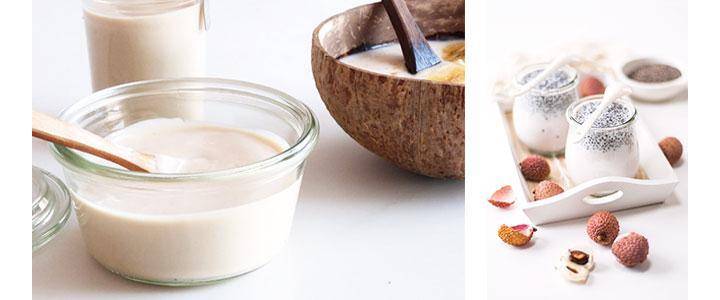The kefir is a probiotic food with properties and benefits for health. It is made from fermented milk, to which lactobacillus bacteria and yeast are added to produce lactic fermentation. It can also be made from kefir nodules or grains produced by other people.
Content
What is kefir?
Kefir is a dairy product similar to yogurt, with a slightly more liquid consistency. Its flavor is mild, somewhat sour, and pleasant, and its consumption dates back thousands of years, originating in the Caucasus region.
It is a type of Bulgarian yogurt also known as bird yogurt in the Chilean region or referred to as kefir milk.
Both the food and the grains used to make it are called kefir.
Properties and benefits
It promotes digestion and relieves the feeling of heaviness, providing nutrients, minerals, proteins, and vitamins to those who consume it.
The properties of kefir are related to the digestive system, which is not surprising as it is considered a probiotic food.
In its composition, we can find calcium, vitamin B12, and various proteins, all with a low percentage of lactose since it is almost entirely converted into lactic acid. This makes lactose intolerance not a problem if you want to consume it.
The number of microorganisms contained in each gram of kefir is about 400 million, the most important being those of the Lactobacillus genus.
Benefits of kefir
One of its great advantages is that it is a type of food suitable for lactose intolerant people. Only very sensitive individuals should not consume it. The rest can enjoy a dairy product with all its properties.
The benefits of kefir are marked by the microorganisms it contains, making it a natural product that can be bought or homemade. Since probiotics in foods are considered one of the best forms of consumption, kefir becomes one of the healthiest foods.
Increases intestinal flora
The content of lactobacilli and other species of microorganisms strengthens the human microbiota after consumption, ideal for improving digestion, preventing gas, and frequent gastrointestinal problems.
Beneficial against candidiasis
Its properties serve as a reinforcement for the immune system, providing better defenses against pathogens, fungi, and yeasts harmful to health.
However, kefir for candidiasis is not very effective since, when used as an oral probiotic, it has little effect against this infection. The intestinal bacteria do not reach the vaginal mucosa, which is why for treating candidiasis, the use of vaginal probiotics and specific antimycotics is recommended.
Acne
The properties and benefits of kefir for acne should always be taken with caution, as it is not an anti-acne food. However, its rich composition of minerals and vitamins can offer positive effects for controlling skin oil secretion.
You can take it to reduce the formation of pimples and blackheads, as well as in cases of psoriasis, dermatitis, and eczema.
But, as we say, it will only act as an additional regulator, and you should undergo appropriate dermatological treatment for your acne problems.
Consuming it will not worsen your symptoms, nor will it cause more pimples.
Gastritis and gastroenteritis
For inflammation of the gastric mucosa or gastritis, kefir can be a great ally. According to the study by the Reference Center for Lactobacilli (CERELA), taking CRL1190 probiotics corresponding to the species Streptococcus thermophilus helps eliminate the discomfort and symptoms associated with this pathology.
Both in gastritis, inflammation of the stomach wall and in gastroenteritis, inflammation of the stomach and intestinal mucosa, the use of probiotics helps control the viruses and bacteria that cause them.
Thus, regularly consuming probiotic foods like kefir can speed up the healing process, reducing discomfort during the days it takes to recover from the infection. Additionally, its consumption prevents the side effects of medications.
Diarrhea
One of its great advantages is that it regulates bowel movements, hydrating the stools and improving the regularity of bowel movements.
There should generally be no problems associated with kefir and diarrhea, although some people with high consumption of this product may notice an increase in their bowel movement frequency.
If you have diarrhea, it is best to stop consuming kefir for a few days until it has completely passed.
Since it softens stools and improves intestinal transit, it could prolong the symptoms for a few more days. It is generally recommended to restrict dairy consumption during diarrheal episodes.
Constipation
This is a situation in which it is highly recommended because, as mentioned, it promotes the dissolution of the rectal plug, especially when the stools are usually very hard.
Kefir for constipation is suitable because it makes the stools more liquid while increasing their frequency.
Pregnancy
You can enjoy it in moderation like other foods. There are no contraindications to consuming kefir during pregnancy, unless you know it typically does not sit well with you.
It is a recommended food for detoxifying and restoring the putrefactive intestinal flora of pregnant women, making it easy to obtain lactobacilli and other microorganisms at home.
Otherwise, you can eat it just as you would yogurt and other natural fermented products.
Gas
Some people think that kefir produces gas because CO2 is released during the fermentation process, but nothing could be further from the truth.
Consuming it regularly improves digestive processes, reducing the time food spends in the stomach and intestines, thus reducing the likelihood of CO2 being produced during digestion.
However, some people may notice abdominal bloating after consumption, indicating that this food “does not sit well with us.” In such cases, it is advisable to stop consuming it.
Does it make you gain weight?
It is neither a slimming food nor a fatty one. Kefir's effect on weight depends on our overall diet. If our meals are heavy and fatty, it will contribute to weight gain, and if our diet is adequate, we will not notice its addition.
Its composition is low in fat and sugars, with few calories.
Below is a table with its nutritional value where you can see how many calories kefir has:
| Per 100g of Kefir | |
|---|---|
| Kcal | 64 |
| Fats | 3.5g |
| Proteins | 3.3g |
| Carbohydrates | 4.8g |
| Potassium | 160 mg |
| Magnesium | 14 mg |
| Sodium | 46 mg |
| Phosphorus | 90 mg |
| Iron | 0.13 mg |
Additionally, as you can see, it is also a good source of minerals as it contains iron, magnesium, potassium, and phosphorus.
Is it natural?
Yes, the only ingredients it contains are all natural. To prepare natural kefir, you will need milk, a glass container, and the nodules with microorganisms, letting it rest away from sunlight at a constant temperature, neither cold nor hot.
This produces a healthy, functional, and balanced food, allowing you to enjoy organic kefir at any time of the day or year.
Differences between kefir and yogurt
Although they are very similar in appearance and consistency, their preparation differs.
Yogurt only requires lactic fermentation, whereas to make kefir, lacto-alcoholic and carbonated fermentation of the milk is necessary, producing lactic acid, alcohol, and CO2 in the process.
Why is kefir considered a probiotic?
Throughout the article, we have been developing the concepts and data on this issue, but in case you missed it, we will now explain why kefir is a probiotic.
Foods and products containing live microorganisms capable of modifying the human microbiota, such as the intestinal, oral, vaginal, and mucosal flora, are called probiotics. Kefir is one of the foods with the most beneficial bacteria for health. In just one gram, there are more than 100 million of them.
Does kefir contain lactose?
To produce it, the milk must be invaded by lactic microorganisms and bacteria, which convert lactose into lactic acid, releasing CO2 in the process.
Certain types of bacteria and yeasts prevent possible contamination by pathogens, enhancing the many benefits of kefir.
This process differentiates it from kombucha tea, which, although it can also be considered a probiotic food, is not free from risks if a microbial colony establishes in it.
At the end of its preparation, we find a transformed product, making lactose-free kefir common, or, if not, it contains very little lactose. We will also detect carbon dioxide and alcohol in the process.
Side Effects
- Diarrhea.
- Abdominal pain.
- Bloating.
Although it is a healthy food for most people, some individuals may feel unwell after consuming it.
If you feel unwell or have a sensitive stomach when trying new foods, it may not be suitable for you.
The side effects of kefir disappear when you stop consuming it, except in cases of food allergies, in which case you should go to a medical center for appropriate treatment.
However, these are isolated cases. The majority of the world's population consumes it regularly without any problems or inconveniences.
Contraindications
- Issues with alcohol.
- Liver disease.
The contraindications of kefir apply to people who cannot consume alcohol. Although its content is low, around 1%, it is enough for some people to avoid it.
What dangers does it have?
The same as any food. It is important to ensure it is not spoiled or in bad condition and that it sits well with you.
Since it has a lower lactose percentage than milk and other dairy products, it is suitable for many people. However, as mentioned in the contraindications, it may not be advisable in certain cases.
Bacteria to make kefir
- Lactobacillus.
- Streptococcus.
- Lactococcus.
The bacteria and microorganisms used to make kefir transform lactose into lactic acid, changing the flavor of the raw material, resulting in a slightly sour or acidic taste, which means the milk is acidified.
In this acidification, there is a precipitation of proteins that can be observed with the curdling, making it an unsuitable culture for pathogenic microorganisms.
Kefir is a functional food very similar to curd and yogurt.
In addition to the mentioned bacteria and fungi, other unicellular microorganisms from the Saccharomyces and Kluyveromyces genera can also be found. These are also present in beer and wine, as they also require fermentation, although it is not lactic.
For the probiotics in kefir to grow and reproduce, lactose and sugars will disappear in the process, serving as nutrients for the microorganisms responsible for fermentation.


